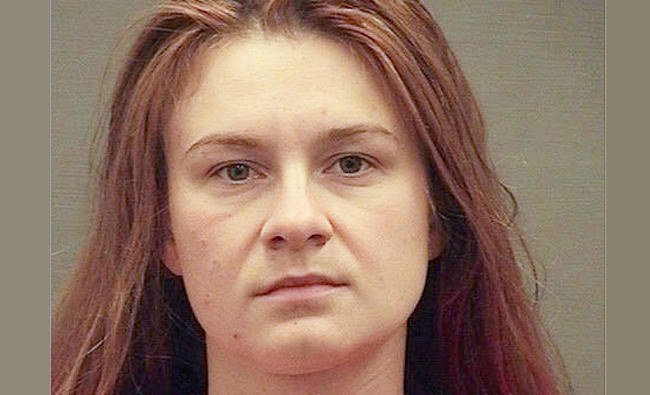Russian agent Maria Butina sentenced to 18 months in US

Maria Butina, the only Russian arrested and convicted in the three-year investigation of Moscow’s interference in US politics, was sentenced on Friday to 18 months in prison.
The leader of a small Russian gun rights group, the 30-year-old Siberian native used her ties to the National Rifle Association to build a network of powerful Republican contacts.
She had admitted one count of conspiracy to act as an agent of a foreign government without registering — a so-called “espionage-lite” charge the US has used before against alleged Russian spies.
Prosecutors said that although she worked openly and was not tied to any Russian intelligence agency, she was sending back reports to a high-level Russian government official and posed a threat to the United States.
“I humbly request forgiveness. I’m not this evil person depicted in the media,” she told the court in Washington before her sentence was announced.
Dressed in a dark blue pajama-like prison uniform, her long red hair pulled behind her shoulders, Butina’s voice broke as she addressed the court in fluent, Russian-accented English.
She told the court she had only wanted to work toward better US-Russian relations and would have registered as a foreign agent if she had known it was required by law.
Moscow expressed outrage over the treatment of Butina, who was given credit for nine months already served and will be deported when she is released.
“The accusations brought against her, intended to influence the internal political process in the United States, are totally invented and fabricated,” Russia’s foreign ministry said in a statement.
“Our compatriot was condemned just because she is a Russian citizen,” it added.
Butina’s case played out against a backdrop of tension between Moscow and Washington over what US intelligence says was a concerted effort by Russian spies to interfere in the 2016 presidential election, using hacking and social media manipulation to help President Donald Trump to victory.
Special Counsel Robert Mueller charged 25 Russians with conspiracy for those activities, but, with all of them believed to be in Russia, none have been arrested.
US prosecutors acknowledged that Butina had nothing to do with those cases but alleged that she was part of a “spot-and-assess” operation to identify potential recruits.
A gun rights campaigner who attended NRA events and invited top gun lobby officials to Russia, she lived as a graduate student in Washington with her boyfriend, a Republican and NRA activist.
Her activities brought her in contact with top Republicans, including Trump at a rally in 2015, where she was chosen to ask the then-candidate about US-Russian relations.
Butina sent regular updates to her handler Alexander Torshin, at the time a senior Kremlin politician and central bank deputy governor who had accompanied her to NRA conventions.
“There is no doubt that she was not simply a graduate student,” Assistant US Attorney Erik Kenerson told the court.
“She was simultaneously trying to make contacts... for the benefit of the Russian Federation.”
Steven Hall, the CIA’s former chief of Russian operations, said her operating in the open was simply an innovative tactic in Russian President Vladimir Putin’s “broader hybrid-warfare influence operation.”
“She’s part of the Kremlin’s plan to try to weaken the United States and the West,” he said.
Butina’s lawyer Robert Driscoll, a prominent Republican attorney, said she had broken no law besides the registration statute, and would not have been pursued had she been of a different nationality.
It remained to be seen whether Butina’s sentencing would impact the case of Paul Whelan, an American corporate security expert arrested while in Moscow for a wedding late last year and accused of espionage.
Some Russian experts said his arrest was retaliation for that of Butina, although Whelan’s brother, David, has said he doesn’t believe the cases are related.
But before Butina’s sentencing Hall, who is no longer with the CIA, said Washington “has to take into account that they do have an American over there, and we have a Russian here.”
“So is there not a deal to be had?” he said.
